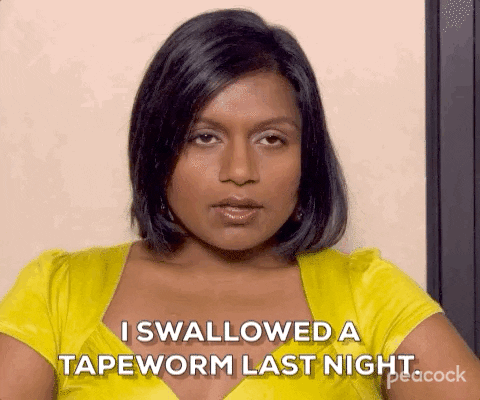There is no "we" in diet
Dieting, shrinking, restricting, and contorting, doesn't have to be a group project.
There are so many group activities you can do. Hiking, dancing, pottery classes, shopping, brunch, and really anything you can think of. But, and this is a big BUT, dieting doesn’t have to be one of them. I can’t say that I am surprised by the surge in weight loss content and media. Let’s be honest, it has always been there because fatphobia has always (unfortunately) been in style.
Thinness is trending again
#SkinnyTok is now trending on social media, which also shouldn’t be a surprise. We knew that the body positivity and acceptance movement was trending backward from its increased 2020 popularity. Not to mention, there seems to be a coincidence with getting smaller and shrinking, with women’s rights and bodily autonomy being in jeopardy.
“A culture fixated on female thinness is not an obsession about female beauty, but an obsession about female obedience. Dieting is the most potent political sedative in women's history; a quietly mad population is a tractable one.” - Naomi Wolf
As controversial and possibly problematic as Wolf herself might be, I think about this quote often. Mostly because when we are in diet mode, all of our energy goes into shrinking and getting smaller. The thing is that we normalize dieting so much that we don’t even realize this. We think the constant food thoughts and low energy are normal and a sacrifice that we should be willing to pay.
And all of this brings us back to #SkinnyTok, which is exactly what it sounds like. Creators, mostly who appear to be in their 20s, are sharing dieting tips that center around eating less and moving more in order to lose weight. And, of course, I will give my usual disclaimer here: everyone is entitled to do what they want with their own body. I am an anti-diet dietitian, but not an anti-dieter. I don’t think there's much point in shaming people into believing that dieting is wrong. However, as a dietitian, I have seen the mental and physical toll that constant restriction has on the body. I know that 80-95% of individuals regain the weight lost, and the constant weight cycling (losing weight, regaining, losing weight, and then regaining) is quite harmful to the body. I even wrote a book about this titled “Live Nourished: Make Peace with Food, Banish Body Shame, and Reclaim Joy.”
So no, I can’t say that I’m thrilled at the resurgence of rhetoric that I thought we all left behind in the early 2000s Tumblr days…
“If your stomach is growling, pretend it’s applauding you.”
“To be small, eat small. To be big, eat big.”
“You don't need a treat. You're not a dog.”
But here we are once again. And because we are all here once again, I want to remind folks that just because everyone seems to be in restriction mode, it doesn’t mean that you have to partake. Dieting is NOT a group project.
Dieting - the water cooler talk
The Office (US version) is one of my comfort shows. I have watched it so many times that I can say the lines along with the actors. It’s one of my favorite go-to television shows for when I want to laugh but don’t want to start a new show because I sort of just want background noise. Anyone else like this? Well, if you also watched The Office, do you remember that one episode (season 5, episode 1 titled “Weight Loss”) when the characters of the show, who were employees of a branch of a paper company, challenged themselves to lose the most weight, as a group, against the other branches of that same company? One of the most memorable parts of that episode is when the character Kelly Kapoor (played by Mindy Kaling) said she ate a tapeworm. Yes, ate a tapeworm in order to lose weight.
Kelly Kapoor : [to the camera] I swallowed a tapeworm last night. It's going to grow up to three feet inside of me, and then it eats all my food so that I don't get fat. And then after three months, I take some medicine, and then I pass it.
Now, this is supposed to be a comedy, of course, so the delicacies of why this is inappropriate are lost within the intended humor of the show. What’s a comedy show without a little fatphobia? I say this sarcastically, of course. Unfortunately, characters in larger bodies were, and still are, used as punching bags for humor. The character of Kevin Malone, played by Brian Baumgartner, who was portrayed as not very smart and awkward on the show, was a prime example of this. The stigmatization of characters in the media has enough material to be its own separate newsletter topic; however, rewatching The Office and this weight loss episode came at an interesting time for me.
At my current 9-5 job, we are constantly bombarded with wellness emails. I am sure that many of you who work for large companies and corporations also receive these types of emails. They are often filled with tips and tricks to better your personal wellness, which doesn’t necessarily seem like such a bad thing. There is nothing wrong with wanting to improve oneself, how an individual sees fit, but the ways of going about it can sometimes raise eyebrows. The invitations to participate in movement activities, such as exercise lunch breaks and walking challenges, can be fun and a way to enjoy some light-hearted competitiveness and bonding with your coworkers. However, on the opposite end of the spectrum, there are invitations to join Weight Watchers (WW) or other weight loss groups. There will be cooking demonstrations or meal ideas that teach you how to incorporate lesser-known vegetables or grains, but then there will also be different ways to burn calories.
In the hallways at work, I cringe at all the signage showing how many calories we burn by walking around the floor a few times or by taking the stairs instead of the elevator. Movement is great and encouraging; it is welcome. However, intent doesn’t always equal action. That’s because weight-loss challenges can be extremely triggering, both for people with a history of dieting or eating disorders as well as for folks who feel the sudden pressure of weight loss after seeing their peers and colleagues take it on. This can lead to potential problems, such as a preoccupation with food and restriction, as well as overexercising and under-fueling. Plus, these workplace challenges don’t actually accomplish the goal that the employers likely had in mind: bettering the wellness of their employees.
Now, don’t get me wrong, there are tons of ways an employer can improve an employee’s well-being. How about we discuss the obvious and the most important, which would be fair pay, sick leave, paid time off, family leave, and really comprehensive health care coverage? In fact, according to a survey by insurance company Unum, the top three non-insurance perks workers want from their employers are generous paid time off, flexible work options, and paid family leave. Zero surprise here, and quite understandable, to say the least.
Are we pursuing health or just thinness?
In today’s society, the pursuit of “health” is so often really just the pursuit of thinness. However, weight loss is not and should not be synonymous with health or wellness. According to the Global Wellness Institute, wellness is “the active pursuit of activities, choices, and lifestyles that lead to a state of holistic health.” It’s an “active pursuit,” meaning you actively partake in activities that can enhance health. For example, taking Pilates classes or adding nutrient-dense foods to your plate would be considered “enhancing.” Weight loss, on the other hand, is more passive; you can’t really control it as fully as you can your behaviors. Those tactics (more movement and eating different foods) I just mentioned might lead to weight loss, but at the same time, they might not. Body diversity is, in fact, a very real thing, and we all have different genetic makeups. People in larger bodies partake in exercise and eat nutrient-dense foods as well. Enter in the social determinants of health in addition to our genetics, weight loss (like health) isn’t truly in our control, but the behaviors we do can be.
Weight loss challenges incorrectly assume that dropping a few pounds automatically leads to better health and, thus, better wellness overall. But the research just isn’t there. I mentioned this briefly in the beginning, but just to reiterate, long-term weight loss is not clearly associated with improvements in lab values such as blood pressure, blood glucose, cholesterol, or triglycerides, nor is it reliably linked to reductions in premature death. What is it linked to? Increases in yo-yo dieting and weight cycling, which research has found, does play a role in premature mortality.
We don’t have to limit ourselves to restriction
We live in a society where it’s the norm to congratulate someone who has shed pounds without knowing what prompted the weight loss or what potentially unhealthy behaviors, say, restricting eating times for certain hours, cutting out foods or food groups, counting calories, or overexercising, may have been in play there. We currently have something called #SkinnyTok trending, which can be incredibly harmful since many impressionable minds have easy access to this information. We tend to look to weight loss, or how a body looks, to give us information on what’s happening inside, which isn’t accurate. Bodies are not business cards.
Weight loss challenges miss the mark for improving "wellness" and health because they don’t take into account all of the combination of factors that affect someone’s health. If we truly wanted to discuss health, we would be talking about equal and equitable health care, access to food, mental health, social connections, access to green spaces, and much more. We would focus less on what a body looks like and more on behaviors that can actually help promote health.
There is so much happening right now in society and with our current administration, shrinking ourselves should be the last of our goals, if not taken off the list completely. So while restriction seems to be the “in” trend right now, we don’t have to participate. We can skip this group project and instead focus our energy elsewhere.
If you like what you just read, don’t forget to give this post a like by pressing the little heart symbol. It lets the algorithm know that this is a valuable platform. Feel free to comment and share as well.
Also, if you want to read more on this topic, I have a book out called “Live Nourished: Make Peace with Food, Banish Body Shame, and Reclaim Joy.” Get your copy today!







"Not to mention, there seems to be a coincidence with getting smaller and shrinking, with women’s rights and bodily autonomy being in jeopardy."
This and the Caldwell image proves that our bodies are a political act. By nourishing ourselves--physically and mentally--we can remain strong and use the power we all possess,.
Another inspiring post. Don't ever stop!
Thank you for your perspective! It’s so disheartening (and yet not surprising, given ::waves hands::) to see this cycle repeat.